Karl Gussow
Karl Gussow (25 February 1843, Havelberg – 27 March 1907, Munich) was a German painter and university professor.[1]
_b_749.jpg.webp)
Life and work
His early inclination to art was encouraged by his family so, as soon as he completed his secondary schooling, he was enrolled at the newly founded Grand-Ducal Saxon Art School, Weimar. This led to studying the Dutch Masters in the studios of the history and genre painter, Arthur von Ramberg. He later worked with the Belgian history painter, Ferdinand Pauwels, who had a decisive influence on his style. In 1867, after leaving Pauwels' studio, he went to Munich to continue his studies with Karl von Piloty, but was there for only a short time before going to Italy, then returning to Weimar.
In 1870, he sent some works to an exhibition in Berlin. This attracted some positive critical attention, which led Count Stanislaus von Kalckreuth, a well known landscape painter, to offer him a professorship at the art school. He was there until 1874, when he accepted a similar position at the Academy of Fine Arts, Karlsruhe. After two years, he moved to the Prussian Academy of Arts. He resigned his position there in 1881, for undisclosed reasons. Two years later, he again went to Munich, where he taught at the Academy of Fine Arts, and established special classes for women, who could not be admitted to the academy at that time.
Among his students were Max Klinger, Hermann Prell, Carl von Marr, Adolf Rettelbusch, Ottilie Roederstein, Anna Gerresheim, and Clara von Rappard.
In style, he was a Realist. Anton von Werner, the Director of the Berlin Academy, said that "the exact reproduction of nature" was Gussow's ideal.[2] He used specially designed brushes that enabled him to create more complex glazes. That type of brush is now known as the "Gussow-Pinsel".
Selected paintings
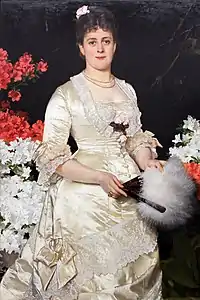 Hedwig Woworsky, 1878
Hedwig Woworsky, 1878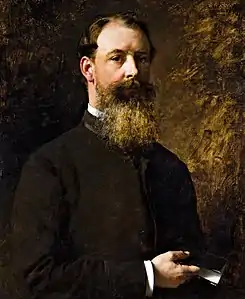 Portrait of a Man, 1883
Portrait of a Man, 1883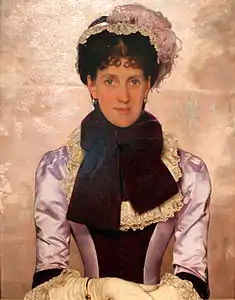 Portrait of a Woman, 1883
Portrait of a Woman, 1883_-_Google_Art_Project.jpg.webp) The Old Man's Treasure, 1876
The Old Man's Treasure, 1876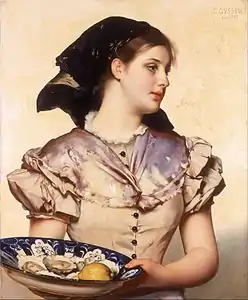 The Oyster Girl, 1882
The Oyster Girl, 1882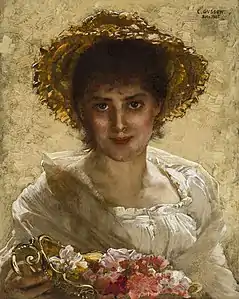 Flora, 1885
Flora, 1885.jpg.webp) Old Gentleman in the Flower Shop (1878)
Old Gentleman in the Flower Shop (1878)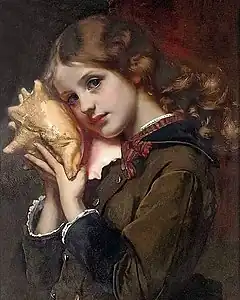 Listening to the Sea (1879)
Listening to the Sea (1879)
References
- Roland Berbig (Hg.): Fontane als Biograph. de Gruyter, Berlin, New York 2010 (Schriften der Theodor Fontane Gesellschaft. 7), Seite 3769, ISBN 978-3-11-022478-8. retrieved 13 December 2012.
- Painterlog: Karl Gussow
Further reading
- "Gussow, Karl". In: Hermann Alexander Müller: Biographisches Künstler-Lexikon, Bibliographisches Institut, Leipzig 1882, p. 227
External links
- ArtNet: More works by Gussow.
- Gussow pinsels Google search results.